A Peaceful Political Revolution Begins In France
An unlikely revolutionary launches "La Revolution Pacifique"
Today (19th April 2016) the city that never sleeps will deliver a verdict on Bernie Sanders "Political Revolution". Meanwhile Across the Atlantic in France another primary race has just begun - for an independent "people's candidate" to stand against France's increasingly unpopular establishment party leaders Francoise Hollande and Nicolas Sarkozy. France has till recently been a little slow to the global democracy rehabilitation party. But no longer, and as a result the race for the French 2017 Presidential Election is heating up.
Scoop's Alastair Thompson, now based in France, profiles Philippe Mazuel one of 86 largely unknown political contenders who stepped up to become the "People's Candidate" for France's 2017 Presidential election. In the process he discusses rehabilitation of the word "Revolution" and backgrounds a race which has all the hallmarks of becoming yet another intensely disruptive political contest.
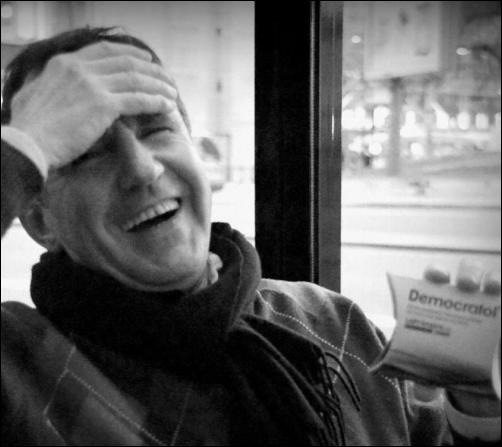
Philippe Mazuel in Montparnasse Paris with a box of Democratol - an innovative treatment for democratic dysfunction
Philippe Mazuel is not your typical revolutionary.
A French Patriot, decorated tank commander in the French Army and Knight of the Legion de Honour, Mazuel graduated from the French Military academy of Saint-Cyr in 1980 before serving in Berlin in the early 1980s and later in a multi-national force deployed to Beirut Lebanon.
Upon returning to France Philippe demobbed in 1985 and then worked for several years selling paper products in the Middle and Near East. In 1988 he became an advisor to the Speaker of the National Assembly Laurent Fabius, who had been the youngest Prime Minister in the French Republican history, and who stepped down as France's Foreign Minister in February.
This was followed by nine years at the heart of France's civil service first in the office of several French Prime Ministers and ending at the European Commission, working on Justice and Home Affairs in relation to the enlargement of the European Union. Philippe then launched a private consultancy on Public Management and European Affairs where he worked for a range of clients including the Russian Government.
In 2007 Philippe founded the PACE Party - a pan European Party which seeks to defend, reform and enhance the European project in the interests of preserving the peace which Europe has enjoyed since the end of World War II.
And four days ago the promise of PACE became a great deal more real when Philippe launched his campaign to be selected as the "people's candidate" for France's upcoming 2017 French Presidential election by participating in the world's first ever digitally organised "People's Primary" election.
His campaign title as you can see in the campaign image below "La Revolution Pacifique" translates as "The Peaceful Revolution".
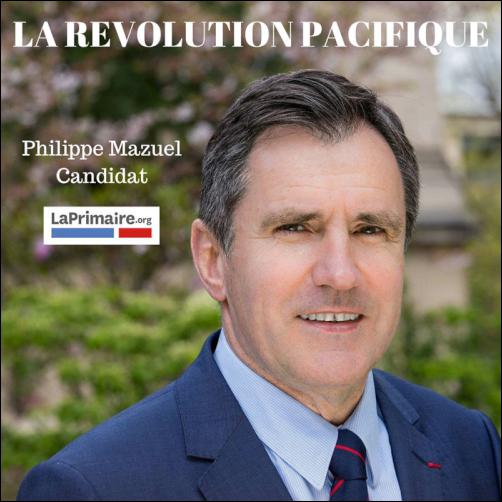
LaPrimaire.org is the latest innovator in a fast growing global movement of digital democratic software initiatives. It is the first solution of a new digital startup called Democratech.
Another prominent player in the global digital democracy movement is New Zealand's Loomio decision making software platform - which is used extensively by the Podemos Party in Spain, a popular political movement which now the third largest Parliamentary Party in Spain.
Podemos grew spontaneously out of the Indignados protest movement which coincided with and shared many of the ideas of the Occupy movement which coined the idea of the 1% which Bernie Sanders is presently putting to good use in his campaign to win the Democratic Nomination in the US.
Loomio, which was founded by a group of Wellington activists who met during Wellington's Occupy protests in 2011, is a sister venture of Scoop Independent News in the Enspiral Network. It was via a Loomio connection that I was introduced to Philippe last year.
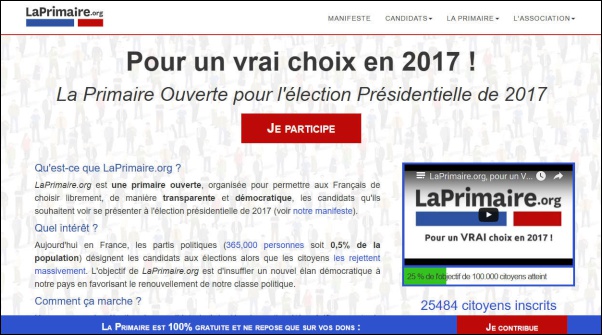
La Primaire
On the La Primaire homepage the organisers point to the fact that only half of 1% of the French population are members of political parties, a total of just 365,000 people in a nation of 66 million.
La Primaire is aiming to put together a people's jury of 100,000, to first refine a list of candidates and then select the candidate who best represents the wishes of the jury by way of a rather intricate (and mathematically fair) process.
La Primaire will then assist the candidate to get together the 500 Mayoral signatures needed to qualify to run in the 2017 French Presidential election, the first round of which takes place in 12 months time.
Launched last year the election application went live on April 4th and so far 86 would be candidates have filled in profiles and have begun seeking supporters. In order to qualify for the next round candidates need to first secure 500 supporters. LaPrimaire's voters will then vote to refine the list to a manageable final list of candidates who will be taken on a nationwide tour of France in the Autumn.
Before launch La Primaire signed up 25,000 of its target of 100,000 voters and raised EUR 54,000 of the EUR 100,000 budget they need to run the campaign.
In early March I met with Maria Mella who manages communications for La Primaire with Philippe in March in a café in Montparnasse Paris to find out more about how the primary would be run. Philippe was keen to obtain some supplies of "Democratol" to share with his supporters.
Maria explained that after kicking off in early 2015 the project really took off during the late 2015 regional elections in which French voters were forced to vote tactically to prevent the Front Nationale from gaining control of three regions of the country.
On December 7th in a spectacular tactical retreat France's governing socialist party withdrew all its candidates in these regions in order to prevent the Front Nationale from winning.
LaPrimaire came up with the idea of promoting LaPrimaire during the regional elections by distributing cardboard boxes of a pharmaceutical placebo they call "Democratol" which it says on the box can be used to treat "electile dysfunction."
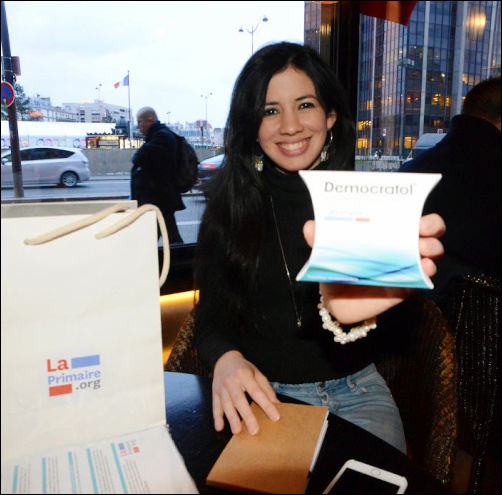
Maria Mella with a box of Democratol
In France the Front Nationale has become the standard barer for anti-establishment political feeling in much the same way that Donald Trump has been activating a blue-collar base in the US in recent months.
And in the four months since the Regional Election shocker the Socialist Party's responses to the threat posed by the Front Nationale hasn't helped its situation greatly.
What it has done is add a dramatic backdrop to La Primaire.
With the two major party leaders suffering near record low levels of public support, Front Nationale Leader Marine Le Pen is pegged by some pundits to be on track to win the first round of the 2017 race.
Some are even suggesting that the highly unpopular but likely Socialist Party candidate, Francoise Hollande, and his Republican Party counterpart, Nicholas Sarkozy, may only poll in the teens in the first round thanks to vote splitting by protest voters.
The collapse in their support means that the possibility of a wild-card "People's" candidate making it into the second round has become a possibility, albeit still a very unlikely one.
And if an outside candidate with significant popular support did make it to the second round vs Marine Le Pen then the election of a "People's Candidate" to the Elysee would become probable for much the same reasons that the Democrats in the US are expected to win the White House this year regardless of who wins the primary.
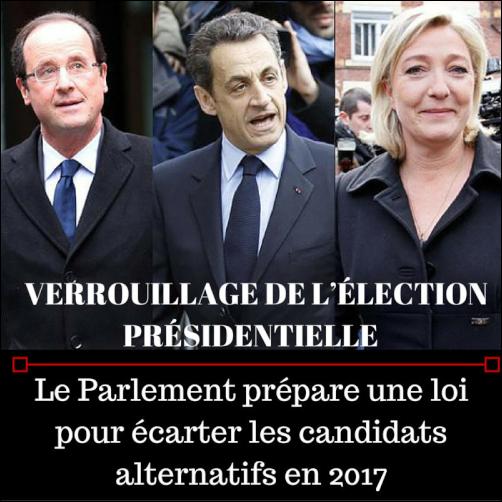
In the first two weeks of Easter - rather ham-fistedly - the governing Socialist Party compounded the possibility of the unthinkable coming true through two unfortunate actions.
Firstly they rushed through an "organic law" - a form of constitutional amendment to France's electoral law which requires the support of an absolute majority of France's Deputies to come into force.
The law " règles applicables à l'élection présidentielle" which surfaced at the end of 2015 around the time of the disastrous regional elections has changed the rules around how the 2017 Presidential Election will be run.
Specifically it makes it harder for candidates without party machinery to first qualify and then compete in the race. Historically the field in the first round of the Presidential race has had around 12 and then 10 participants in the past two cycles.
The
so-called "modernisation law" contains provisions
which:
- make it harder for candidates to collect the 500
mayoral signatures they need to stand by a) making the list
of signatures public and b) changing the rules so that the
mayors have to submit their sponsorship statements to the
Constitutional Court directly rather than allowing the
candidates to collect submit the signatures ;
- halve the
period of "equal time" coverage during which the media have
to give minor candidates a chance to be heard;
- halve
the period of time during which candidates have to account
for their campaign expenses from 12 months to 6 months,
thereby making it easier and cheaper for the major
candidates who are already in political office to campaign
without running foul of the rules.
Given that the Socialist Party's nemesis Nicolas Sarkozy is currently facing prosecution for misuse of public funds for electioneering purposes during the 12 month window, this provision could almost be read as their tacitly approving of Sarkozy's illegal and widely condemned actions.
Further compounding the offence caused by the law is the way it was passed during the Easter break.
The law returned for debate in France's National Assembly for a second reading on Maundy Thursday (a.k.a. Holy Thursday) the day before Good Friday. Ironically this is the day that servant leadership is celebrated in the Roaman Catholic Church via re-enactments of Jesus's washing of the feet of his disciples.
This debate took place in a nearly deserted National Assembly according to reports. The bill was then sent to Frances Senate which approved the amended bill on Thursday 31st March.
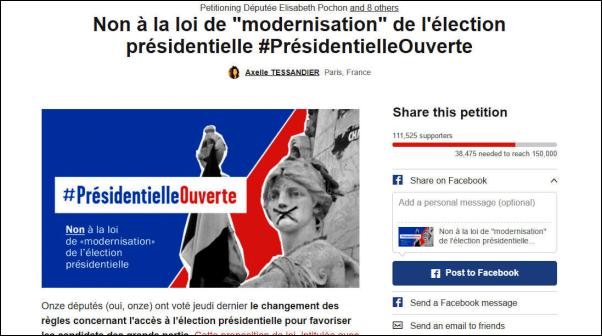
Over the 13 day period between the March 24th National Assembly consideration of the law and its final passage into law on Tuesday 5th April more than 50,000 French voters signed a public petition against what Mazuel at the time called a "law of locking" of the election. This petition now has 115,000 signatures.
Meanwhile as this controversial bill was rushed through the legislative process and a battle raged on social media, on the streets a potent new political movement emerged spontaneously out of widespread protests against labour market reforms in cities all over France.
In several cities the protests turned violent and batons and tear gas was used. Paris's mobilisation on 31st March was particularly large and took place at the same time that the French Senate was approving of the election reform law.
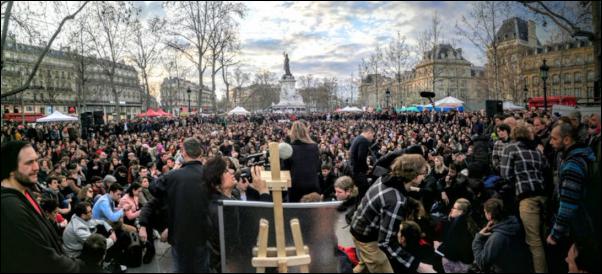
#NuitDebout began on March 31st and keeps getting bigger
The right to protest is exercised a lot in France, where they call protests "manifestations" and so the violent protests and police response - although not that unusual - certainly caused a lot of discussion and anger.
And then something remarkable happened. On the night of the 31st of March the protesters in Paris's Place de la Republique decided to not go home and instead launched a new phase of global democracy activism began under the title #NuitDebout (which translates as "up all night").
Since the 31st of March protestors have held nightly General Assemblies in the Place de la Republique in what looks a lot like a re-run of the "Occupy" movement which began in New York City's Zuccotti Park in 2011 and which was responsible for worldwide protest action against inequality and popularisation of the idea of the 1%.

Philippe Mazuel's "La Revolution Pacifique" policy platform
All of which make's La Primaire and Philippe's candidacy in the 2017 contest potentially very interesting to watch.
In normal circumstances it would be nigh on impossible for an outsider lacking a party machine and millions of dollars of campaign funds to get either the support, or the attention, needed to seriously challenge the supremacy of major party candidates.
However in 2017 the combination of:
1/ how
the French President is elected (two rounds - 1st
elimination & then a straight 2 horse race); and
2/ how
LaPrimaire works (effectively creating the possibility of
the spontaneous creation of a large popular public movement
behind its victorious candidate) means there is potential
for this new iteration of digitally enhanced democracy to
produce a very disruptive result.
Disruption of establishment politics is something the world is getting increasingly used to.
Disruptive energetic youthful and imaginative political change campaigns appear to be sweeping the world: the Pirates in Iceland; Jeremy Corbyn in the UK; Justin Trudeau in Canada; Bernie Sanders in the USA, Podemos in Spain and Syrizia in Greece. Mostly founded by outsiders from the political process.
Several of these movements now have representation in National Parliaments, two - in Canada and Greece - are actually in power and others are challenging hard for real political influence.
All these movements represent a genuinely new way of looking at politics focussed on the needs of people and rejecting neo-liberal economic orthodoxy .
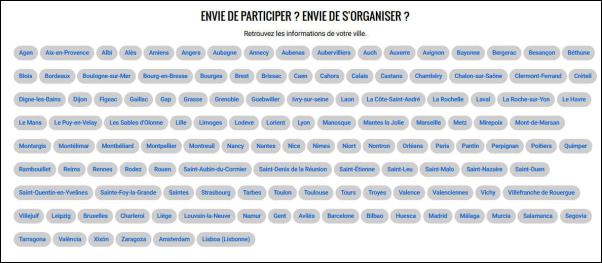
Since March 31st the growth of #NuitDebout is showing many people in France are prepared to mobilise to ensure France is not be left behind by the democratic reform movement which is sweeping the globe.
Notwithstanding post Paris terror attack state of emergency laws which prohibit large public meetings, #NuitDebout events are now being held in120 different towns and cities around France and 23 cities elsewhere in Europe.
This week a call has also gone out in six languages for activists to come to France on May 7th and 8th to plan a global day of action for May 15th (see English statement ).
And France is certainly an appropriate place for new wave of peaceful democratic revolution to begin.
France's several republics were all founded on the ideals of "liberté, égalité, fraternité" (Liberty, Equality and Love/Solidarity) and is arguably the birthplace of the modern concept of democracy by, of and for the people.
The 1788 US Constitution was inspired by French enlightenment ideas about democracy, particularly the philosphies of Voltaire, Montesquieu, and Rousseau.
In France four years after its Revolution a 1793 constitution of the 1st French Republic was approved by a referendum employing universal male suffrage. 1.8 million votes were cast with more than 99% in favour. The constitution included a range of provisions which were at last 100 years ahead of their time including the right to work, the right to free association, public assistance, the right to education and the abolition of slavery. The constitution did not however come into force as threats to the security of the young republic took precedence.
The draft constitution also included in clause which granted the people a "right of rebellion" and went so far as to assert that insurrection is a duty of citizens in some circumstances.
"§35: "When the government
violates the rights of the people, insurrection is for the
people, and for every portion thereof, the most sacred of
rights and the most indispensable of
duties."
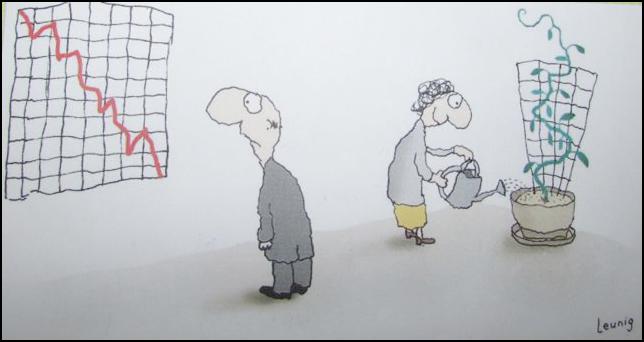
Cartoon by Michael Leunig
"Revolution" is of course for many a very loaded word - especially in the French context which included extensive use of the Guillotine (which may explain why the word does not appear on the Nuit Debout website which instead uses the word rebellion).
But Political Revolution is also an idea which over the past decade has been significantly rehabilitated. In recent months it has been seen daily in our news columns the world over driven by Bernie Sander's repeated use of the term "political revolution" in his primary campaign.
"What my campaign is about is a
political revolution - millions of people
standing up and saying, enough is enough. Our government
belongs to all of us, and not just the hand full of
billionaires.
And Bernie is far from alone in using the word.
Jeremy Corbyn has also used the word extensively, mainly in the context of a "democratic revolution" within the UK Labour Party.
"We
want to see this democratic revolution
extend into our party.. opening up decision-making.. to the
hundreds of thousands of new members and supporters that
have joined us since May. It’s a huge opportunity for
Labour: to remake our party as a real social movement..
organising and rooted in our communities. That’s not about
fighting sectarian battles or settling political scores.
It’s about being open to the people we seek to represent
… giving them a voice through our organisation and
policy-making.. and drawing members into political
action."
The word is also being used increasingly in a spiritual context.
Pope Francis has been speaking of a "Revolution of Love and Tenderness" as the framing for his Jubilee year of Mercy which began at the end of 2015.
"If we are open to this
revolution of tenderness, the Pope says, we
ourselves will become more tolerant, more patient and more
tender, learning not to treat people as
objects."
Japanese Buddhist Teacher Daisaku Ikeda similarly emphasises the idea of internal "Human Revolution".
"To
possess both wisdom and compassion is the heart of our
human revolution. If you have wisdom alone
and lack compassion, it will be a cold, perverse wisdom. If
you have compassion alone and lack wisdom, you cannot give
happiness to others. You are even likely to lead them in the
wrong direction, and you won't be able to achieve your own
happiness."
And Australian
cartoonist philosopher Michael Leunig focuses on the need
for internal change in his "The Art of Gentle Revolution" prayer.
"God help us to
change.
To change ourselves and to change our
world.
To know the need for it. To deal with the pain of
it.
To feel the joy of it.
To undertake the journey
without understanding the destination.
The art of
gentle
revolution.
Amen."
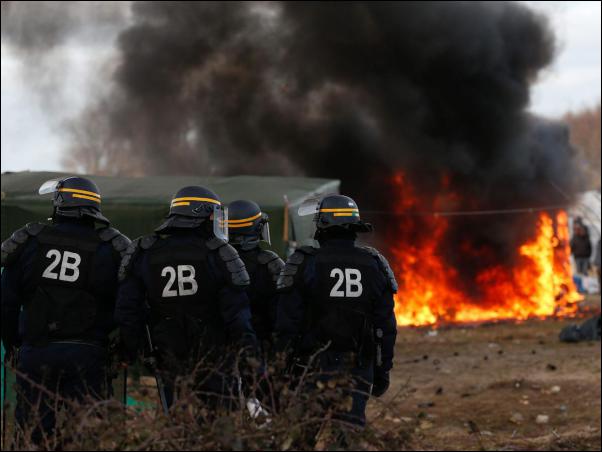
Police watch on as the makeshift tents of refugees in the Calais Jungle burn. Image (Creative Commons) by Amirah Breen
Philippe Mazuel's peaceful political revolution is also rather gentle.
The political ideas of PACE while ambitious, are in political terms more centrist in their appeal than revolutionary.
In 2014 PACE published a book of it's political ideas "Donne une voix à l'Europe" which was the culmination of several years of thinking by members of the PACE team. The book sets out a set of lenses through which a broad range of political policy challenges can be viewed from biodiversity, to border security, economic policy and job creation and the maintenance of cultural diversity.
The book has since been translated into German, Spanish and most recently English where it has been given the title "Give Europe A Voice, Give Europe a Vote." An updated translation of the first chapter of the book which contains a proposal for reforming the European Union was published on Scoop in March.
Practical problem solving is at the heart of PACE's approach to political revolution.
When faced with political challenges framed as a contest between competing interests, PACE's consistent approach is to seek a policy response which seeks to satisfy both sides of the debate.
For example the debate over the ongoing evolution of the Europe Union (EU) is typically framed in terms of "ever closer union" vs "national sovereignty", a seemingly insoluble tension which has given rise to #Brexit.
PACE's proposal formulated back in 2013 and published in 2014 is to seek to deliver an ever closer union to those parts of Europe that are ready for it, and to provide a clear path to preserve sovereignty for those parts of the EU which are not.
To satisfy the Member States which want to move forward towards a political union, while respecting those which, like the United Kingdom, do not wish an “ever closer union”, one must create a political Federation bringing together highly motivated Member States.
In the medium and long terms, Europe would therefore be organised in 3 concentric circles:
- The European Republic (or European Commonwealth) could include the six Founding States (Germany, Belgium, France, Italy, Luxembourg, The Netherlands) and the countries which came on board more recently but feel ready to enter a political federation. The European Republic would be an economically and politically strongly integrated area; beside the current competences of the Euro Area, it would have some competence in the fields of Taxation, Social rights, Energy, Migration and Borders, Foreign Affairs and Defence.
- The European Union, made of its 28 current Member States plus countries of the Western Balkans which are not members as yet (Albania, Former Yugoslav Republic of Macedonia -FYROM-, Bosnia-Herzegovina, Kosovo, Serbia, Moldova - which could become an autonomous province of Romania) and Iceland, Norway and Switzerland if those States wish to accede. The "new" EU would keep developing various common policies and could play the role of ante-chamber of the European Republic;
- The Grand Europe or European Confederation
, i.e. the European Union plus Russia, Ukraine, Belarus, Turkey, Armenia and Georgia, an intergovernmental area of deepened economic, legal and cultural co-operation. The Council of Europe, which already includes 47 States, could be the frame of this Confederation.
It is clear that some EU countries do not want a political Europe (i.e. the United Kingdom). Let us respect their position but let us not be slowed down by them.
At this stage the activist base of the PACE Party, whose name is the ablative declension of "pax" in Latin (as in Pax Romana), is comprised mainly of a group of young thoughtful professionals who have an interest in public policy.
A few weeks ago I visited the HQ of PACE in the coal-mining town of Henin-Beaumont in Northern France with Philippe.
PACE chose to locate its office in Henin-Beaumont as the town is a strong-hold of the Front Nationale, the right wing nationalist Party of Marine Le Pen which came close to winnng control of the Northern Region of France in elections at the end of 2015.
In the region the Front Nationale has been particularly successful in recruiting young underemployed youth as supporters and PACE wanted to provide an alternative political choice for this group.
And during the 2015 regional elections PACE made its first big push to move from political theory into action, to transition from political think-tank into genuine political movement.
In order to qualify to have a party list in the ballot they needed to put together a list of 180 candidates. In the end they fell 26 candidates short of the 180 required. Notably more than 50% of those candidates were women and approximately one third were aged under 30.
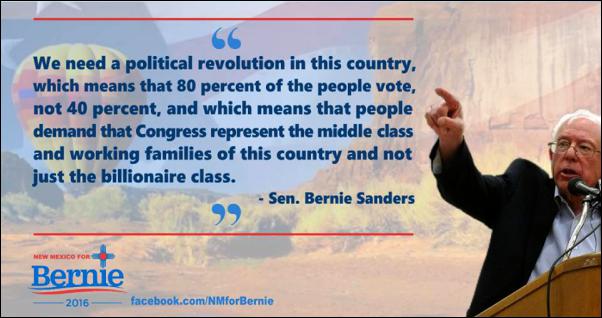
Thanks to Bernie Sanders astonishing run for the Democratic Nomination talk of political revolution is in the air and on the airwaves everywhere.
Today New Yorkers voting in the Democratic Primary contest have the entire world's attention. If Bernie wins or performs well in the race in New York - which seems likely - then the democracy reform movements in France which LaPrimaire is part of will receive a significant boost in energy.
And it is into this context that Philippe Mazuel has launched a campaign framed as "La Revolution Pacifique" a Peaceful Revolution in public administration, both for France and Europe.
Mauzuel describes outlines his "La Revolution Pacifique" in detail on his La Primaire policy profile page.
The opening description on this page translated in to English reads:
"While rich in talent, know-how and
creativity, France is facing a never ending crisis: an
economic crisis, of course, but above all a crisis of
confidence and hope in the future. To restore balance,
France must rebuild the processes it uses to select it's
political and administrative "elites", those who direct the
ship of state. As in 1789 or in 1958, our country needs a
revolution, a peaceful revolution." (a
translation)
Over the next six months it will become clear whether this unlikely revolutionary's prescription for change resonates within the context of the unique grass roots political revolution that has begun over the past month in France.
Alastair Thompson | 500 Words, 19th April 2014


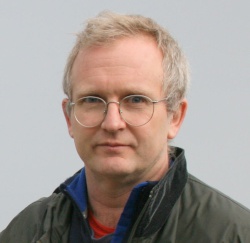
 Ian Powell: Postscript On Ethnic Cleansing, Genocide And New Zealand Recognition Of Palestine
Ian Powell: Postscript On Ethnic Cleansing, Genocide And New Zealand Recognition Of Palestine Gordon Campbell: On Why Leakers Are Essential To The Public Good
Gordon Campbell: On Why Leakers Are Essential To The Public Good Ramzy Baroud: Global Backlash - How The World Could Shift Israel's Gaza Strategy
Ramzy Baroud: Global Backlash - How The World Could Shift Israel's Gaza Strategy DC Harding: In The Spirit Of Natural Justice
DC Harding: In The Spirit Of Natural Justice Martin LeFevre - Meditations: Animal Encounters During Meditative States
Martin LeFevre - Meditations: Animal Encounters During Meditative States Ian Powell: Gisborne Hospital Senior Doctors Strike Highlights Important Health System Issues
Ian Powell: Gisborne Hospital Senior Doctors Strike Highlights Important Health System Issues